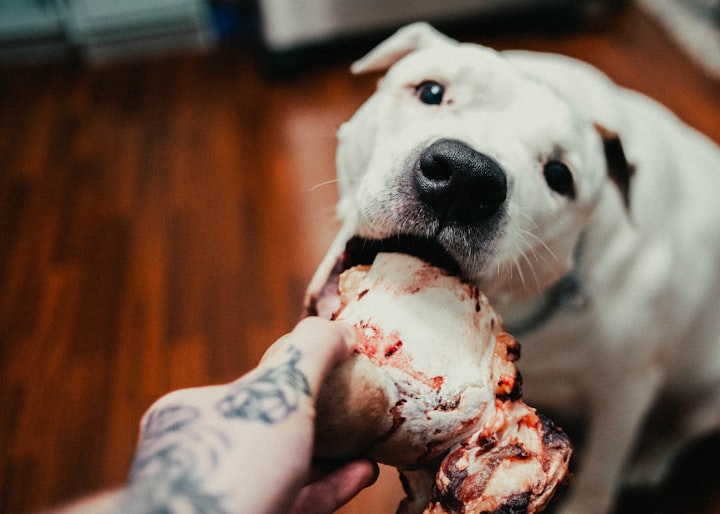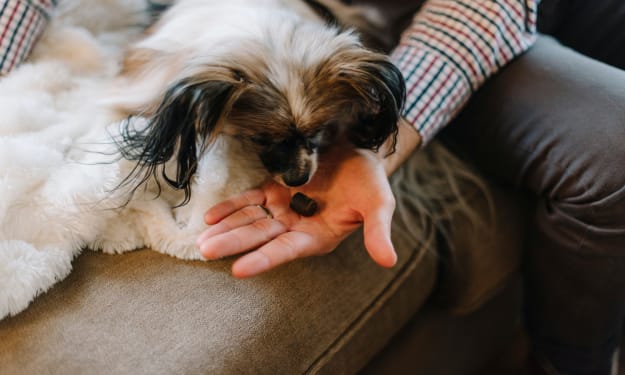Dangerous Foods for Dogs: 10 Treats You Shouldn’t Be Giving Your Pup
While we want to share everything with man’s best friend, some treats we enjoy like ice cream, trail mix, BBQ, and other foods can cause harm to dogs. Here are some dangerous foods that you should never give Fido, and a few treats you never would have expected he might like.

1) Don’t Feed: Macadamia Nuts
Nuts offer humans many health benefits from their fatty acids, proteins, vitamins, and minerals. While some nuts are OK for dogs to eat in moderation, like unsalted peanuts and cashews, other nuts are not OK. Macadamia nuts are some of the most toxic foods that dogs might consume.
Dogs that have eaten macadamia nuts may experience vomiting, increased body temperature, lethargy, and inability to walk. In some cases, these nuts can adversely affect your dog’s nervous system. Never give them macadamia nuts and be sure to keep the trail mix and white chocolate macadamia nut cookies far out of their reach.
2) Don’t Feed: Chocolate
In moderation, dark chocolate can give humans the health benefits of antioxidants, minerals, improved blood flow, increased good cholesterol, and reduced risk for heart disease. Chocolate for dogs is another story, and that includes white, milk, and dark chocolates. Chocolate contains toxic particles called methylxanthines which causes a dog’s metabolic processes to cease. Dark chocolate contains the highest levels of this and can immediately cause vomiting, diarrhea, seizures, irregular heart function, and even death. If your dog accidentally consumes chocolate, call your vet right away. Depending on your dog’s size and how much chocolate they ate, they may be OK on their own or they may need a vet’s immediate attention. Regardless of how much chocolate they ate, pay close attention and take your dog to your trusted veterinarian if you notice any abnormal symptom or behaviour, like the ones mentioned above.
3) Don’t Feed: Xylitol
You may not recognize the word xylitol, but your taste buds are very familiar with it! Xylitol is an artificial sweetener that is often found in popsicles, chewing gum, drinks, and candies. It is often used in products that are labeled ‘diet’, ‘low-fat’, and ‘sugar-free’, and can even be found in some peanut butters. While human consumers love the low-calorie appeal and taste, foods and treats containing xylitol can cause a dog to go into hypoglycemia, which is linked to liver failure and blood clotting disorders.
4) Don’t Feed: Cooked Bones
If you’ve just eaten a big rack of BBQ ribs, your dog is sure to be begging for a taste of those delicious rib bones. Because bones are often sold in stores as a treat for dogs, not many people are aware of the harm that bones can cause your dog. Any bones that have been cooked, like rib bones, chicken wing bones, ham bones, and more can easily splinter as your dog chews on them. When ingested, these splintered bones can cause constipation, diarrhea, or even puncture the gut or intestines, which often proves to be fatal in dogs. Uncooked beef bones, like beef marrow bones are thought to be okay, however, this is actually quite a controversial subject.. Even marrow bones are dangerous, sometimes more dangerous than raw chicken bones. Due to their circular shape and hole, dogs can actually stick their mouths in the holes and need surgery, and because they are usually really hard, they may break a tooth trying to chew on them. The information about cooked bones is correct. Never give cooked bones of any type or shape or size.. Uncooked bones, like beef marrow bones that can be purchased from a butcher are OK for them to chew on, but never give your dog poultry bones because they can splinter cooked or uncooked. Observation: this is a controversial subject, because even marrow bones are dangerous, sometimes more dangerous than raw chicken bones. Due to their circular shape and hole, dogs can actually stick their mouths in the holes and need surgery, and because they are usually really hard, they may break a tooth trying to chew on them. The information about cooked bones is correct. Never give cooked bones of any type or shape or size.
5) Don’t Feed: Fat
Your family is having a summer get-together and a big smoked pork butt on the bar-b-que is the main attraction. Once your ravenous family is done feasting, you’re left with a big pile of fat trimmings that smell irresistible to your dog. While your dog may be descended from carnivores that can eat an entire wild boar, meat fat, both cooked and uncooked, should not be given to your pet. Too much fat can cause your dog to develop pancreatitis. Pancreatitis can cause abdominal pain, decreased appetite, dehydration, diarrhea, fever, lethargy, nausea, and vomiting. However, a small amount given occasionally should not cause problems.
6) Don’t Feed: Grapes and Raisins
While there are many healthy fruits that your dog can enjoy and benefit from, like bananas, apples, strawberries, and blueberries, grapes and raisins are a definite no-no. The exact element in grapes and raisins that causes adverse effects in dogs is unknown, but we do know that they can cause severe liver damage and kidney failure. So keep your fresh fruit bowl, raisin bread, and oatmeal raisin cookies high away from your dog’s reach.
7) Don’t Feed: Avocado
Another fruit that offers lots of health benefits to humans but is poisonous to dogs is avocado. Avocado is rich in fiber, healthy fats, potassium, and vitamins, but it also contains a substance called Persin which causes vomiting and diarrhea in dogs. This substance is found in the fruit’s flesh, seed, and the leaves of the tree itself. So if you’ve decided to grow your own avocado tree as a fun experiment from a leftover seed, be sure it’s in a spot your dog can’t gnaw on it.
8) Don’t Feed: The Onion Family
Garlic, onions, leeks, shallots, chives, and everything in the onion family is poisonous to dogs, though the symptoms might not appear right away. When a dog ingests these, it can cause red blood cell damage and gastrointestinal upset. Garlic has some of the strongest effects and can cause anemia in dogs, with side effects of pale gums, elevated heart rate, weakness, and collapse. If you think your dog may have eaten items from the onion family, be sure to monitor them for the next several days, and be prepared to take them to your trusted veterinarian.
9) Don’t Feed: Alcohol & Yeast Dough
We’ve all seen a movie or a TV show where an animal may have accidentally consumed an alcoholic beverage and appears comically drunk. In real life, however, alcohol is dangerous for animals. Never give your dog beer, wine, liquor, or any other alcoholic beverage. There can be serious consequences for your pet even in small doses. In dogs, alcohol can lead to sickness, diarrhea, decreased coordination, tremors, central nervous system damage, coma, and even death.
Yeast dough, both store-bought and homemade, is dangerous to give to your pet. Once your pet ingests it, the yeast finds a nice warm, dark environment in the stomach where it can grow and the dough will continue to rise. This expanding dough can lead to bowel obstruction and a distended stomach. The stomach may also twist which leads to a GDV, or gastric dilatation and volvulus, which are life-threatening situations that require surgery to correct. Yeast dough can also give off alcohol as the yeast ferments, leading to alcohol poisoning for your dog.
10) Don’t Feed: Ice Cream
Ice cream seems harmless enough, but this summertime treat is not something you should share with your dog. Ice cream is packed with sugar and might contain toxic xylitol. Also, some dogs are lactose intolerant and ice cream would give them some gastrointestinal distress. A nice, icy alternative to give your dog is frozen strawberries, raspberries, and pineapple chunks.
What Treats Can My Dog Eat?
Sometimes, the best policy is to avoid giving your dog anything that is not dog food or dog treats made specifically for canines. But if you want to spice up their diet with healthy foods you have around the kitchen, here are some common foods many dogs love:
- Peanut butter (read the label to make sure it doesn’t contain xylitol)
- Unsalted peanuts
- Carrots
- Sweet potatoes
- Pumpkin
- Bananas
- Apples with the seeds removed
- Cooked eggs
- Fish
- Quinoa
- Yogurt
What to Do If You Think Your Dog Ate Something Dangerous
If you think your pet ate something toxic, you can call your vet or the pet poison helpline. The pet poison helpline is available 24 hours a day, 7 days a week at 1-855-764-7661. The vet or the helpline can help you decide whether immediate emergency care is needed for your dog, or if you should monitor their health for symptoms and signs of damage.
If you’ve never had a pet dog before, there’s a lot you’re going to learn along the way. It can be tempting to give your dog everything you eat, too, but many of the foods we eat can be harmful and even deadly for your pet. Even if you’ve grown up with family dogs over the years, your parents may not have been aware of the possible harm that can come from innocent table scraps. Now, we have the internet to help keep us informed about ideal dog food, train, and exercise our pets to keep them healthy, happy, and with us as long as possible.
About the Creator
Cyd Ross
Cyd Ross is a founding member of an organization dedicated to rescuing livestock and pets from evacuation zones. Ranch life has given her experience with most animals, but her focus is on training horses and dogs.






Comments
There are no comments for this story
Be the first to respond and start the conversation.